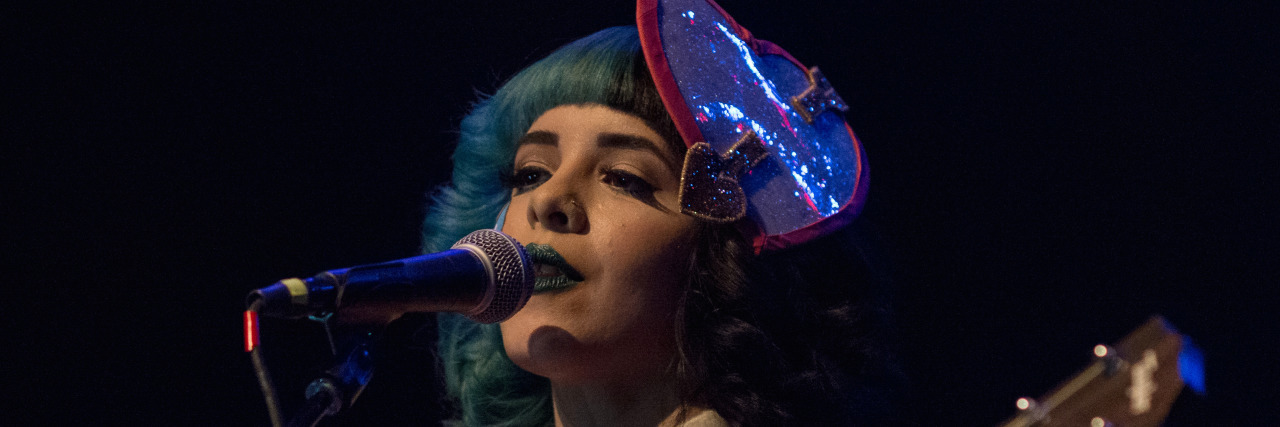In recent years discussion about mental health and awareness about mental illness has been on the rise. The conversation has even found its way into pop culture with musical artists like Sia. However, mental illness still remains a popular trope in pop music, as seen in Melanie Martinez’s new song “Mad Hatter” off her new album Cry Baby. While the song is meant to be Cry Baby‘s acceptance of her madness, I believe it instead perpetuates many stereotypes about mental illness.
It plays on the concept of sanity, with its opening notes conjuring up images of an asylum. At its core, the song creates a distinction between those who are “normal” and those who live with a mental health condition, saying “The normal, they make me afraid. The crazies, they make me feel sane.” This is detrimental to the many advocacy efforts that assert people who live with mental illness are just like everyone else. Calling those with mental health conditions “crazy” perpetuates the stigma surrounding mental illness.
Those with mental illness are characterized as “nuts,” “mad” and “psychos.” Such language harms those who do live with mental illness.
“I’m nuts, baby, I’m mad,
The craziest friend that you’ve ever had
You think I’m psycho, you think I’m gone
Tell the psychiatrist something is wrong.”
It further establishes an othering effect in which people with a mental health concern should be set apart from the “normal” people in society. It perpetuates the idea that mental illness is contagious and that people with such a condition should be quarantined. Such language labels people on the basis that their emotional experiences deviate from what is considered “normal” and creates a sense that they are lesser as a result. This is particularly true in light of the fact that Melanie Martinez, the artist, is a woman. Labels like “crazy” are more frequently applied to women due to their perceived emotional nature and desire for more intimate human connection in an effort to invalidate their emotions.
The way mental illness is described in the song makes it synonymous with violence. The actions of the “crazy” in the song are depicted as reckless and cruel, with them “popping balloons with guns” and “[painting] white roses red, each shade from a different person’s head.” Our society already views people with mental illness as violent due to the way media discusses mental illness and lyrics like these only further perpetuate that stereotype.
Also within the lyrics is a message that encourages people to go off of their psychiatric medication. It tells of being better off and more liked by others when off medication despite something being wrong:
“Tell the psychiatrist something is wrong
Over the bend, entirely bonkers
You like me best when I’m off my rocker.”
This is a dangerous message to be hidden within the lyrics of a pop song, for there can be serious consequences for stopping medication without the oversight and approval of a psychiatrist. It again perpetuates negative stereotypes by claiming it is better to be off medication. Those who do take psychiatric medication already face significant stigma and the message in the song implies that such medication is unnecessary because people will like you more when you are off your medication.
Perhaps the worst of all is that all of these messages are intended to make this inaccurate depiction of living with mental illness desirable, stating, “So what if I’m crazy? The best people are.” The title of the song itself is an insult to those with a mental health condition, because “mad as a hatter” is a derogatory phrase. The song “Mad Hatter” by Melanie Martinez solidifies the notion that in our society there are people who are normal and abnormal and everyone must be categorized into these divisions.
Social acceptance of mental illness is critically important because discrimination follows stigma. “Mad Hatter” elicits negative views about mental illness and perpetuates harmful stereotypes, contributing to the stigma that surrounds mental illness. Though intended to be a song of acceptance, “Mad Hatter” does not reflect the fact that one in four people experience a mental health concern in a given year and that they are to be viewed and treated no differently than anyone else.
This post originally appeared on the Active Mind‘s blog.
We want to hear your story. Become a Mighty contributor here.

